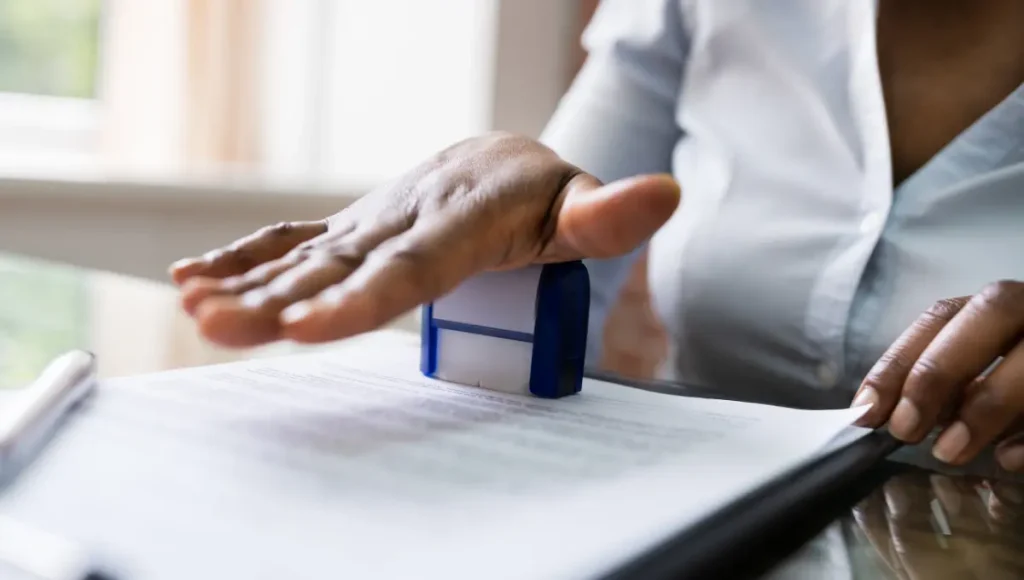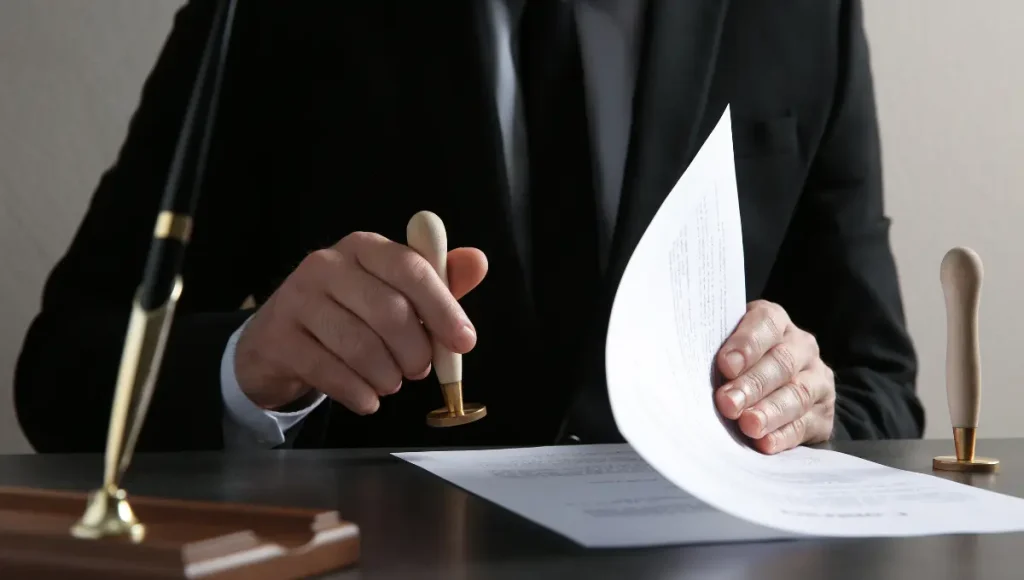In India, property transactions are notarized on a stamp paper. A notary advocate attests to it, instead of registering it with the government. While this may seem like a quicker and easier process, it is legally invalid for establishing proper title to the property.
Notaries play a role in some property transactions. But, they only verify identities and witness affidavits and agreements. They cannot be used to establish legal ownership of the property.
If you are considering buying a property that was previously notarized, make sure it is properly registered. Also, check that it has all the necessary documents, including the LRS. Buying property legally is the safest way to avoid trouble and ensure safety.
How To Register A Notary Property In India

Process for Property Registration in India
The property registration process in India involves several key steps:
Identify Jurisdiction
- The first step is to identify the proper Sub-Registrar’s office that has jurisdiction over the location of the property.
- This is where you will need to visit to get the sale deed registered.
Prepare Documents
- Gather all the needed documents for the property. These include the original sale deed, ID proofs of the buyer and seller, and any other relevant paperwork.
- The sale deed must be prepared on stamp paper of appropriate value as per the stamp duty payable.
- Required documents typically include
- Aadhaar card,
- Verified copy of the original old sale deed,
- Passport-size photos of buyer and seller,
- No Objection Certificate copy (Land Ceiling Act),
- Latest property register card copy,
- Municipal tax bill copy,
- Construction Completion Certificate,
- and Recorded agreement between the builder and the original purchaser.
Pay Stamp Duty and Fees
- Find the stamp duty by finding the circle rate and the transaction price.
- Stamp duty is a percentage of the property value. It differs slightly by state and is usually 5%.
- Before preparing the power of attorney, you need to buy non-judicial stamp papers. You use them to pay the stamp duty.
- You can buy them online or at the Collector of Stamps of the relevant area.
Present Documents and Verification
- Take all the needed documents, including the sale deed, to the Sub-Registrar’s office.
- The Sub-Registrar will then check the documents. They will ensure that both the buyer and the seller are genuine.
- When all these things are properly in order, the sale deed will be registered.
- This process might take about 5-7 business days. It would cost around Rs 10000.
Biometric Verification
- During registration, the buyer and seller must input their finger print.. They must also input other forms of ID, like photographs.
- This is done to improve security. It prevents fraud and ensures the transaction is real.
Payment of Registration Fee
- After you do the biometrics, pay the fee at the Sub-Registrar’s office.
- The fee usually ranges from one percent of the transaction value or Rs 30,000 as per the lower limit.
Collection of Registered Deed
- Once the registration is complete, a receipt of registration is issued.
- The registered sale deed will be ready to collect from the Sub-Registrar Office after 2-7 days from the working days.
- Attend the appointment to get the registered deed.
- Take the appointment slip and required documents to the Sub-Registrar’s office on the booked date.
Properties in India are registered under the Indian Registered Act 1908. It ensures the title deeds and authentic documents needed to avoid fraud. They may also be useful.
The buyer must register the property to become its legal owner. The courts cannot accept unregistered documents.
Role of Notary Public in Property Transactions

- Verifying all party’sidentities involved in the transaction
- Witnessing the signing of legal documents related to the property
- Preventing fraud and ensuring the integrity of the transaction
- Ensuring compliance with state laws and regulations
- Serving as an impartial third party to the transaction
Verifying Power of Attorney
If a property transaction involves a power of attorney, the Notary Public plays a vital role. They verify the identities of the person giving the power and the attorney. They also attest their signatures. This ensures that the attorney is acting on behalf of the executant and has the authority to do so.
For example, if an old person is selling their property and has appointed their child as their attorney, the Notary Public will check the IDs of the parent and the child. They will also check that the power of attorney document is valid and properly signed.
Witness for Affidavits
Notary Publics can do this for property affidavits, includingownership or consideration affidavits. An affidavit is a written statement. It is considered as true as verbal testimony. Affidavits are sworn in the presence of a Notary Public, which increases their weight.
For example, a property owner who wants to stand before a court or other legal authority and confirm ownership of a property can do so with an affidavit of ownership. Notary Public should witness the affidavit. The owner will sign the affidavit. The Notary Public will ensure the validity of the signature and the owner’s identification.
Witness for Agreements
Notary Publics can also witness any agreements involving property, like sale or lease agreements. This allows the Notary Public to guarantee the validity of the signed agreement. by witnessing the signatures of all the signatories. This process eliminates potential future conflicts.
For example, the landlord and the tenant may be entering a lease. In this case, they will both sign it in front of a Notary Public. The Notary Public will sign. They will witness the two parties’ signatures. This will make the lease legal and fully enforceable.
Conclusion
The Notary Public has an essential role in property transfers. But, their role is quite limited. It includes identification, witnessing, and curbing fraud. But for one to transfer ownership of the property there must be compliance with the legal procedures of the government.
Follow the right registration process and ensure your property has all the needed legal documents. This will protect your investment and bring peace of mind to property owners in India.
FAQs
No, a notarized document alone does not establish legal ownership. The property must be officially registered with the local sub-registrar’s office to be recognized as a legal transfer of ownership.
The property registration process usually takes 2 to 5 working days after submitting the necessary documents and payment of fees, though this can vary depending on the location.

